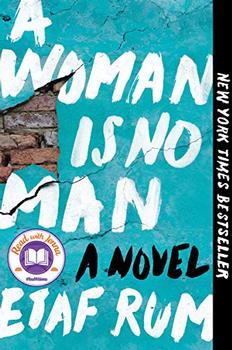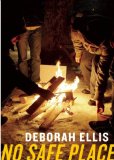Summary | Excerpt | Reviews | Beyond the book | Read-Alikes | Genres & Themes | Author Bio

Paperback Original.
From the book jacket: The Paradise projects are only a few metro stops
from Paris, but here it's a whole different kind of France. Doria's father, "the
Beard", has headed back to their hometown in Morocco, leaving her and her mom to
cope with their mektoub—their destiny—alone. They have a little help - from a
social worker sent by the city, a psychiatrist sent by the school, and a thug
friend who recites Rimbaud.
It seems like fate’s dealt them an impossible hand, but Doria might still make a
new life. She'll prove the projects aren't only about rap, soccer, and religious
tension. She’ll take the Arabic word kif-kif (same old, same old) and mix it up
with the French verb kiffer (to really like something). Now she has a whole new
motto: Kiffe Kiffe Tomorrow.
Comment: Welcome to Paradise - a public housing complex in the
Parisian suburb of Livry-Gargan, home to 15-year-old Doria and her mother; and
former home to her heavy-drinking father, until he pushed off back to Morocco to marry
a second wife in order to have a son. When Doria's parents
emigrated in the mid-1980s they imagined their lives would be like one of the
sophisticated black and white movies of Paris they saw on French TV channels
back home with an "antenna rigged up from a stainless-steel couscous maker", but
instead they're living in a tiny two-room apartment eking out a life lived on
handouts and credit - as Doria puts it, "our scriptwriter's got no talent. He's
never heard of happily ever after." Doria's mother, Yasmina, is
illiterate and works terrible hours for appalling pay at a motel where the
manager refers to all the Arab cleaners as "Fatma", the blacks as "Mamadou" and
the Chinese as "Ping-Pong"; and Doria, despite obviously being very bright, is
struggling at school, while a veritable flock of social workers wander in and
out offering helpful advice.
It's a seemingly hopeless life. Doria says "we worry about the future but
there's no point. For all we know we might not even have one. You
could die in ten days, or tomorrow, or suddenly, right over there, right now.
It's the kind of thing that doesn't exactly make an appointment" - it's all just
"kif-kif tomorrow" (same shit, different day). There are a few rays of
hope, there's Rimbaud*-reciting Hamoudi who didn't finish school because he got sent to prison,
but who at least is someone who seems to understand Doria; there's the despised
pizza-faced Nabil (who Doria calls Nabil the Nul - Nabil the Zero), who helps Doria with her
school work; and there
are the social workers, who despite Doria's cynicism are both well-meaning and
helpful; and among other things get Yasmina into a paid literacy program,
where she thrives, slowly gaining confidence as a person in her own right and
not as somebody else's daughter or wife. There are a number of other
characters who we never meet but hear about in passing, such as mild-mannered Youssef, who
gets sent to prison on a minor offence and soon becomes "radicalized".
The strength of Kiffe Kiffe Tomorrow (pronounced keef) is the narrator's voice. Doria,
a bubbling pot of contradicting teenage emotions is a wickedly funny observer of
her environment, who doesn't believe in leaving things unsaid and has made a
moral code for herself from TV programs, "TV today is like the poor person's
Koran". Through short, diary-like chapters she brings us up close and
personal with her life and the very real problems of being a poor immigrant
living in an effective ghetto, surrounded by poverty, bigotry, racism and
misogyny - so we can get some sense of how overwhelming it is to survive in such
an environment, let alone to dream of finding a better life.
It's not giving too much away to say that during the year she narrates, Doria
does a lot of growing up, and both she and her mother transition from "unwanted
females" into people who value themselves. A number of reviewers have
compared Doria to Bridget Jones, and it is a fair comparison, as her story is
not only ultimately hopeful but also very funny -
by the end Doria is starting to see that it just might be possible to create a
new motto for her life - instead of kif-kif, she borrows the French verb kiffer
(to really like something) to come up with Kiffe-Kiffe Tomorrow!
As always, don't take my word for it - experience this unique new voice
first hand by browsing an excerpt at BookBrowse.
*Rimbaud: A French poet, 1854-1891.
![]() This review
first ran in the October 5, 2006
issue of BookBrowse Recommends.
This review
first ran in the October 5, 2006
issue of BookBrowse Recommends.

If you liked Kiffe Kiffe Tomorrow, try these:

by Etaf Rum
Published 2020
"Garnering justified comparisons to Khaled Hosseini's A Thousand Splendid Suns... Etaf Rum's debut novel is a must-read about women mustering up the bravery to follow their inner voice." —Refinery 29

by Deborah Ellis
Published 2011
No Safe Place is a novel of high adventure and heart-stopping suspense by a writer at the height of her powers.
Your guide toexceptional books
BookBrowse seeks out and recommends the best in contemporary fiction and nonfiction—books that not only engage and entertain but also deepen our understanding of ourselves and the world around us.